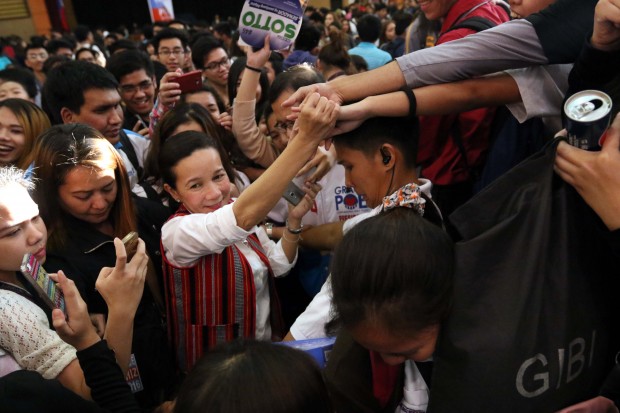Pleas vs Poe top SC summer agenda
The Supreme Court begins its summer session in Baguio City on Tuesday, with the motions for reconsideration on its ruling allowing Sen. Grace Poe to run for president on top of its agenda.
The motions for reconsideration filed by the Commission on Elections (Comelec) and the four private petitioners in the disqualification cases against Poe will be deliberated, and possibly voted, upon by Tuesday, according to sources in the high court.
The sources, who asked not to be named for lack of authority to speak to the media, said the high tribunal considered the Poe case and other cases related to the coming elections a “priority” since there is only about a month left before the polls.
The Supreme Court will be deciding whether or not to reconsider the majority ruling that the Comelec committed grave abuse of discretion when it disqualified Poe for material misrepresentations in her citizenship and residency eligibilities for the presidency.
Should the high court affirm its 9-6 vote and stand firm on its ruling in favor of Poe, the decision would then become final. But if the court reverses itself and upholds her disqualification, a second motion for reconsideration, this time from Poe’s camp, may still be entertained.
Article continues after this advertisementIn its 56-page motion for reconsideration, the Comelec asked the high court to rethink its March 8 decision, undertake new deliberations and conduct another round of voting, arguing that there was no majority vote finding Poe a natural-born Filipino qualified to become president.
Article continues after this advertisementThe poll body echoed the dissenting opinion of Senior Associate Justice Antonio Carpio who said that only seven out of 15 justices—one less than the required majority of eight—voted that Poe was a natural-born Filipino.
Based on the decisions they wrote or concurred with, five justices dissented from the majority opinion but three limited their opinions on whether or not the Comelec committed a grave abuse of discretion in canceling Poe’s certificate of candidacy.
Chief Justice Ma. Lourdes Sereno, however, had claimed that the seven comprised a majority of the 12 justices; the remaining three having been excluded from the count as they did not take part in the deliberations.
On the residency issue, the Comelec cited the dissenting opinion of Justice Teresita Leonardo-de Castro that Poe was not compliant with the 10-year residency requirement for presidential candidates as mandated by the Constitution.
The four private petitioners who sought Poe’s disqualification—former Sen. Franciso Tatad, De La Salle University political science professor Antonio Contreras, former Government Service Insurance System counsel Estrella Elamparo and former University of the East College of Law dean Amado Valdez—also filed their joint motion for reconsideration on March 18.
They warned of repercussions from the majority ruling, saying that it “will cause the election of a true nuisance candidate or the disenfranchisement of millions of Filipinos.”
They also contested the majority opinion that presumed Poe to be a natural-born Filipino based on circumstances such as physical appearance as well as statistical probability.
On Friday, Tatad asked the high court to consider the position of the Integrated Bar of the Philippines (IBP) and several prominent lawyers in resolving the appeals.
The IBP board of governors said in a recent statement that legal questions on Poe’s eligibility still stood since the Supreme Court ruling did not resolve the issues involving her qualification as a natural-born and 10-year resident of the Philippines.
